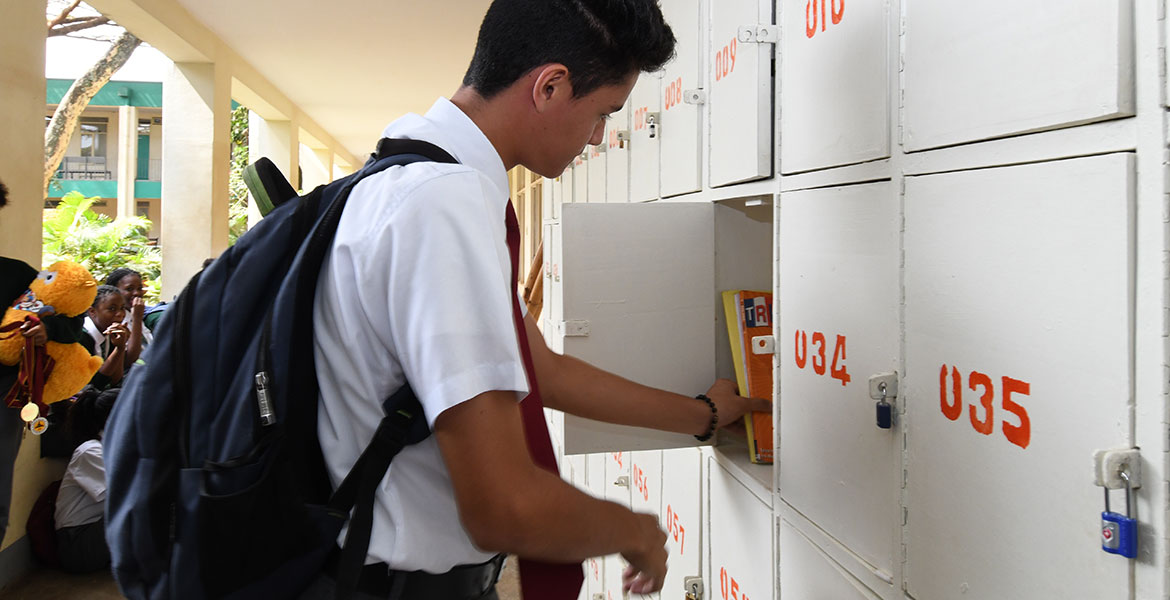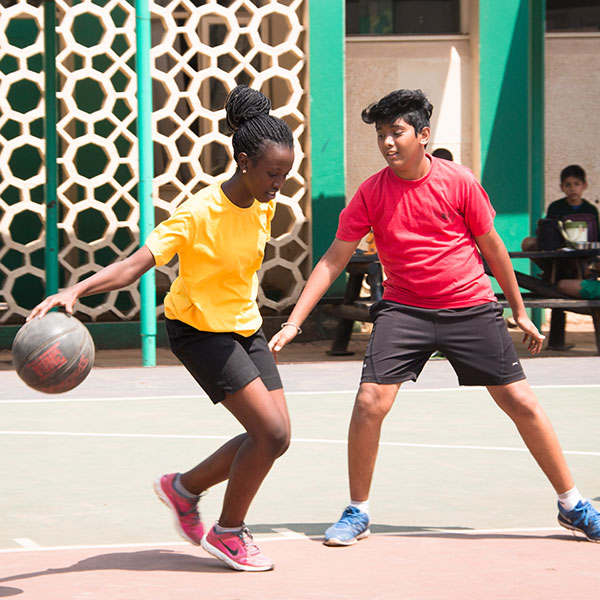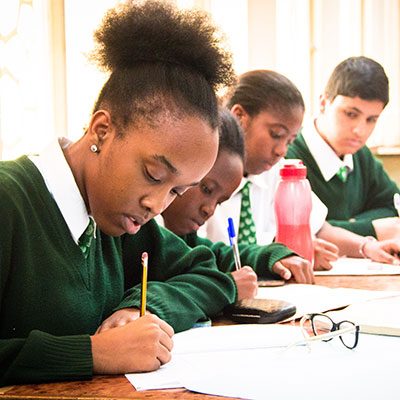
The Aga Khan High School, Kampala propels its students to become top performers nationally and internationally, by adopting the best international and contemporary teaching and learning as well as educational leadership philosophies. The School offers both National and International curriculums.
The School offers the Key stage 3, International General Certificate of Secondary Education (IGCSE) and the International Baccalaureate (IB) Diploma.
Select a Curriculum:
The International General Certificate of Secondary Education (IGCSE) is a world-recognized qualification, based on the British General Certificate of Education (GCSE). The IGCSE caters to different levels of ability and is a flexible course of study that provides a broad knowledge base and lifelong skills.
Students join the high school in Year 7, where they follow the KS3 British Curriculum KS3 till Year 9; the students start IGCSE course in Year 10. The final examinations for the IGCSE program in the School takes place in May and June every year.
Course requirements and examinations are administered from the Cambridge University. There is an assessed coursework option alongside examinations.
The IGCSE ideally prepares students for the International Baccalaureate (IB) Diploma programme.
Students explore their interests and likely future options, gaining an understanding of High School culture and expectations. They take a range of subjects: English Language and Literature, Mathematics, Social Studies (History, Geography, Business), Sciences (Chemistry, Biology, Physics), a second language (French), Computer Studies, Art, PSHE (Personal, Social and Health Education) and Sport.
In years 10 and 11, students must sit for Mathematics, English Language and six optional subjects at IGCSE level. In preparation for the next level, the International Baccalaureate Diploma, students must pursue English Literature, a Second language (French or Swahili), a Science and Humanity subject. A second Science subject is strongly recommended.
The subjects for the IGCSE are grouped as follows:
Languages (Group I)
Humanities (Group II)
Sciences (Group III)
Mathematics (Group IV)
Creative, Vocational and Technical (Group V)
Students are expected to take a minimum of 8 subjects and a maximum of 10.
 The Aga Khan High School was authorized to teach the IB Diploma programme, starting in September 2005. The International Baccalaureate (IB) is a nonprofit educational foundation established in 1968. It currently works with 2,650 schools (56% public) in 136 countries to develop and offer three challenging programs to over 575,000 students aged 3 to 19 years.
The Aga Khan High School was authorized to teach the IB Diploma programme, starting in September 2005. The International Baccalaureate (IB) is a nonprofit educational foundation established in 1968. It currently works with 2,650 schools (56% public) in 136 countries to develop and offer three challenging programs to over 575,000 students aged 3 to 19 years.
In keeping with the ethos of the IB advocates, our school advocates international mindedness, which is the development of responsible citizens of the world with young people who are active participants in their local and national communities, as well as in the broader international community.
The IB Diploma is challenging, but well within the means of average but hardworking students. It is designed for students aged 16 to 19.
The curriculum contains six subject groups together with a core made up of three separate parts.
The School offers the following:
Group 1
English A Literature
Group 2
French B, French AB
Group 3 (Humanities)
Group 4
Group 5
Group 6
Visual Arts
Students can do either 3 HL and 3 SL subjects for the DIPLOMA or 4 / 5 subjects for the Course.
Apart from the six subject choices there are also three core requirements of the Diploma course:
1. The extended essay:
2. The interdisciplinary TOK course:
Designed to provide coherence by:
Part I – focus on limitations of humans as knowers – perceptions, emotions, languages, reason.
Part II – development of skills to evaluate knowledge claims in the various disciplines.
3. Participation in the school's CAS program:

Students join the high school in Senior 1, where they follow the Uganda Secondary Education curriculum till Senior 4 when they sit the UNEB O levels in October/November every year.
The subjects for the Ordinary level are grouped as follows:
I. ENGLISH LANGUAGE
English Language
II. HUMANITIES
Literature in English
History
Geography
III. LANGUAGES
French
Lugha ya Kiswahili
IV. MATHEMATICS
Mathematics
Additional Mathematics
V. SCIENCE SUBJECTS
Physics
Chemistry
Biology
VI. CULTURAL SUBJECTS/OTHERS
Art
Music
VIII. BUSINESS STUDIES
Computer Studies
Entrepreneurship
Students are expected to take a minimum of 8 subjects and a maximum of 10.
The Uganda Certificate of Education (UCE) and Advanced Certificate (UACE) are based on the original British ‘O’ and ‘A’-level models. The Ugandan National Examinations Board sets the syllabus and examinations.
As with British qualifications, the local programme allows students entry to international universities. The Ugandan programme is highly regarded in the region and attracts students from neighbouring countries.
It aims to develop scientific, technical and cultural knowledge and understanding for individual and national advancement; equip learners with the ability to contribute to a self-sustaining and independent national economy; produce well-balanced individuals who relate positively to society.
The syllabus is fairly traditional though high standards are set with rigorous study of eight or nine subjects at ‘O’ level and three or four subjects at ‘A’ level. Most schools depend heavily on a teacher-centred approach, with written examinations and less emphasis on skills-building and assessment.
For UACE, students select a combination of three Principal subjects from the selection below:
Science Combinations
General Paper is a compulsory subsidiary subject. As a supplement to their examined subjects, A-level students are offered relevant computer courses.
The Aga Khan High School recognises the importance of a well-rounded education. All students are encouraged to participate in co-curricular or "extra-curricular" activities.
These include but are not limited to:
School events include an annual play or musical, Cultural Day, Careers Day, termly Guidance and Counseling afternoons, Work Placement, Leavers’ Dance and graduation ceremony.
Physical education and fitness is a compulsory part of the curriculum. The School competes in Inter-School Leagues in: Soccer, Basketball, Cricket, Lawn Tennis, Volleyball, Badminton, Athletics, Swimming and Table Tennis. Coaches and student leaders support three well-qualified sports teachers.
Every Thursday students can participate in any of the school's 15 clubs including: Music, Dance and Drama; Art; Aerobics; Chess and Scrabble; Table Tennis; Hockey; Swimming; Scouting; First Aid; French; Environment; Computing; Library; Badminton; and Lawn Tennis.

Houses exist to offer students indoor competitive activities including Sports, Public Speaking, Music and Dance, Art, and Science Quiz. Each House: Hawks, Eagles, Kites and Falcons, is led by an elected House Captain and Deputy.
The School encourages students to be responsible from a young age.
Student Council members are school leaders and student role models who guide and counsel their peers, helping to develop positive behaviour and values. In June and October, students, staff and the Head Teachers appoint the leadership teams for the International and National sections respectively. The Council is led by a president and two vice presidents and their service lasts for a year.
They meet to exchange ideas and address issues that genuinely concern the entire school community. Council recommendations are given to the Head Teacher for consideration and feedback.

The school's Careers Counselor works closely with students on their subject choices, university applications and career decisions through the formative years of secondary education.
The counseling service organises:
The School enjoys an excellent reputation for producing high calibre graduates who pursue university education. The Counselor formulates student transcripts and prepares testimonials required for further education applications. Alumni pursue further education in the USA, Britain, Canada, Australia, New Zealand, South Africa, India, the Middle East, Kenya, Uganda and elsewhere.

A qualified Social Counselor assists teenage students to cope with challenges that arise at home and in school. The pressure and stress adolescents experience is considerable from all directions. Counseling is therefore an essential component of teaching.
The Counselor provides guidance to teachers to ensure that each one is able to be an effective counselor. Teacher input is essential for the Study Skills (for all students) and Learning Support (for all students) programmes, which focus on building student confidence. Serious social disturbance cases can be referred to external specialists by parents.
The Counselor also advises staff on incorporating HIV-AIDS information and awareness into their lessons and curricular material. Peer counseling has proven to be an effective means of reaching out to students.
The School, with support from the Aga Khan Education Services, is strongly committed to promoting and enhancing quality education. Better trained and skilled teachers provide a more varied, interesting and enriched learning experience for students.
Teachers are recruited through a rigorous selection process. Candidates present a demonstration lesson, which is used to assess their teaching skills. They also undergo a written and oral interview by the School administration. The teacher selection criteria include: competence and experience in the subject area, understanding of modern teaching methods and commitment to broad-based learning, motivation towards the teaching-learning process and openness to change.
Teachers are mainly Ugandan professionals with representation from other cultural backgrounds who are dedicated to the Aga Khan Schools' educational philosophy and to bringing out the best from each child. Many have Masters degrees; some are distinguished authors, examiners, researchers or curriculum developers.
A unique feature of Aga Khan Schools is the emphasis on ongoing staff professional development. The High School is part of the International Academic Partnership, which promotes global education and student-centred teaching at participating schools.
The School regularly organises workshops and seminars for management and teaching staff. In-house implementation of best practice methodology is overseen by senior staff, some of whom have postgraduate qualifications in education from the Aga Khan University. This is part of the Aga Khan Education Service’s policy to constantly improve educational standards.
Teachers keep abreast of pedagogical research, incorporating effective and diverse teaching techniques into the classroom. Faculty regularly discusses and shares books, materials and teaching techniques, promoting a learning culture amongst teachers.
The AKU-IED also offers short courses by extension in Uganda to upgrade classroom skills, classroom management and use of information technology in teaching. Specialised exposure to international curricula is undertaken regionally and overseas and by distance learning.
Day to day professional staff development takes place in the classroom rather than in workshops. Ultimately, the processes of professional development and appraisal must benefit students, who deserve the very best the School can offer.
The effectiveness of any school is clearly linked to the attitudes, qualities and skills of its teaching staff and an intensive appraisal process is necessary to stimulate exemplary performance.
Faculty and non-teaching staff appraisal takes place periodically through the year and a formal evaluation takes place at year-end. Department heads, professional development trainers, deputy head teachers and the head teachers observe classes. It is normal practice for staff to appraise one another collegially through class visits or team teaching and reflect on teaching practices.
Syllabus coverage is monitored every term by the Academic Team, who appraises work schemes, records and student exercise books.

© Aga Khan Schools 2009 - All rights reserved
Terms & Conditions | Privacy Policy
The Aga Khan Schools are part of the Aga Khan Education Services,
an agency of the Aga Khan Development Network
© Aga Khan Schools 2009 - All rights reserved | Terms & Conditions | Privacy Policy
The Aga Khan Education Services are part of the Aga Khan Schools,
an agency of the Aga Khan Development Network.